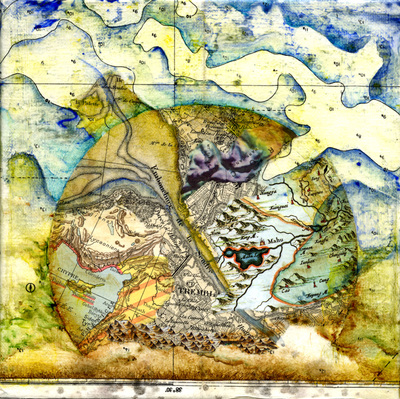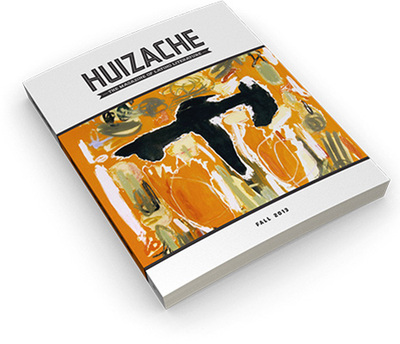RICH IVES
All the Eds
Brown Elfin Butterfly
As simply as the moment forward finally becomes the direction to lean and then rise from, we
acknowledge we’ve been eating salal, bitterbrush, and blueberry in the forests and the brush-
lands. A confession of type. A singular family.
Ed’s top’s down, brown below us, and we realize we’re Ed, hind-parts blunt to his tail, irregular
white line separating the dark brown inner region from the pale pinkish-brown outer region.
Terrestrial and squared, Ed’s ownership lies fallow. Right now, Ed doesn’t even own Ed. It’s as
if one were to suddenly realize a hooded snail could really be monkish.
Now think about elevating. Ask a contrail. Ask a series of mysterious dots on an unopened wing.
Ask a bowl of fog. Ask the departure of primal indifference.
We hover (nearly all of the Eds) above moist ground along roads through forests. We watch the
sunset trekking and the celestial cadavers. We tire in the face of bright compliments. We sleep in
a darkness that burns with no flame and no heat.
Ask impenetrable thickets. Ask the yellow goat. Ask the legendary Captain Slobber, he of the
wallowing in it, he of the silent whining. Ask Slobber’s trail to unwind. Ask the brighter children
of premature sunsets.
Something else, something indecipherable is still here, kissing and kissing with Ed, as if love
required more than two of us, restrained yet finally releasing, before the double lover of self
could even begin to look for a mate.
Do you know that nothing merely chosen satisfies like wild blueberry and kinnickinnick?
Now ask forgiveness for all that you have not done.
Now do it.
All the Eds will be listening. All the Eds will be you.
We awaken. We do.
Understanding the Dominant Mythologies of Reproduction among the Perceptually Challenged
Brown-banded Skipper Butterfly
We had names for things that didn’t match, moth-like, for example, which Martin claimed we
were, though mostly above, gray-brown on the forward side, crossed by rows of generally
separated grown spots, tawnier there. Martin called that The Dove Principle.
Martin’s children appeared first to be little more than small lanterns, a little pale and darkened to
a golden green. Later, they carried yellow speckles and lines dotted with orange. They fed on
vines and seemed to be climbing out of a glossy green recumbence, dreamily considering the city
gardens of Texas, while hotels of welcoming vines grew elsewhere and suffered.
Sometimes Martin seemed to nest in a colony of Martins and eat up little versions of himself. He
flew around like a madman and gathered up just enough ideas of himself to make a meal, and
then he perched and re-examined himself, as if he felt now that he was satisfied, there must be
something missing, because he could never really be satisfied with the satisfactions he had
already known.
There’s a space over the pond all the Martins like to occupy briefly, as if time hitched and
whatever they could find there could go away with them. All the Martins looked alike because
all the Martins were really as one, and the space over the pond was the same. Each Martin
experienced the space thinking it was unique and went on about his (or her, because Martin was
diverse and rather curious about survival) day just like all the other Martins, who were equally
busy devouring themselves. We had a name for this that didn’t match, of course, but we didn’t
wish to clutter the air with confusing spaces, so we just flapped and flapped and grew lighter
without noticing because the name for it didn’t even suggest that’s what we were doing.
The voice of reason wasn’t really The Voice of Reason any more than The Dove Principle was
generated by a bird. We liked to think of them as dreary and droll so that we could celebrate just
that much more when we discovered differently, which we did almost every time we made
another discovery.
Growth Variables
Cabbage White Butterfly
The cabbage’s assertions had been broken and the broccoli was no longer complaining. The top
of the problem was white, a little dingy in the female, the forward elements dusted with black at
the apex.
Underneath the problem was a cream or pale olive impression, European, inadvertently
introduced in the 19th century. It had become at home in urban developed areas, speaking with
gestures instead of words as the undersides of cabbage, broccoli, nasturtium leaves.
Earlier there had been a certain green with a fine yellow line on the sides that diminished as the
two or three generations per year began to appear. Life was short in the early days. Sometimes
we overlooked the horizon as a result, and it closed in upon us. Ion sauntered past, intoxicated by
the possibilities, which remained unnamed and potential.
A fat little package of wingless containment arrived without mobility or elevation. We began to
sort the package into clothing types. There wasn’t a single doorman. The windows remained
open and the dutifully expected fire was so small a single wing put it out. Where did it come
from?
The package of course was a member of the crowd now and could no longer be separated from
appearances. Ion was trying to explain what had happened, but he wasn’t really listening to
himself. Broccoli was absent. Cabbage was absent.
There are thousands of these cloud parts floating with their arms out, Ion explained, not really
listening. Imagine the cloud they might appear to be if they ever came together and didn’t bump
each other.
What shall we do now with the leftover packages?
I don’t know how to explain the appearance of someone else’s clothing, said Ion, tucking in his
outer garments from the inside. He wasn’t really all thumbs though you might imagine it if you
perceived the thumbs as gentle and pale and very much above you in your leafy expansions.
Copyright © February 2021 Rich Ives
Rich Ives has received awards from the National Endowment for the Arts, Artist Trust, Seattle Arts Commission and the Coordinating Council of Literary Magazines for his work in poetry, fiction, editing, publishing, translation and photography. He is the 2009 winner of the Francis Locke Poetry Award from Bitter Oleander and the 2012 winner of the Thin Air Creative Nonfiction Award. His books include Light from a Small Brown Bird (Bitter Oleander Press—poetry), Sharpen (The Newer York—fiction chapbook), The Balloon Containing the Water Containing the Narrative Begins Leaking (What Books—stories) and Tunneling to the Moon (Silenced Press—hybrid).









